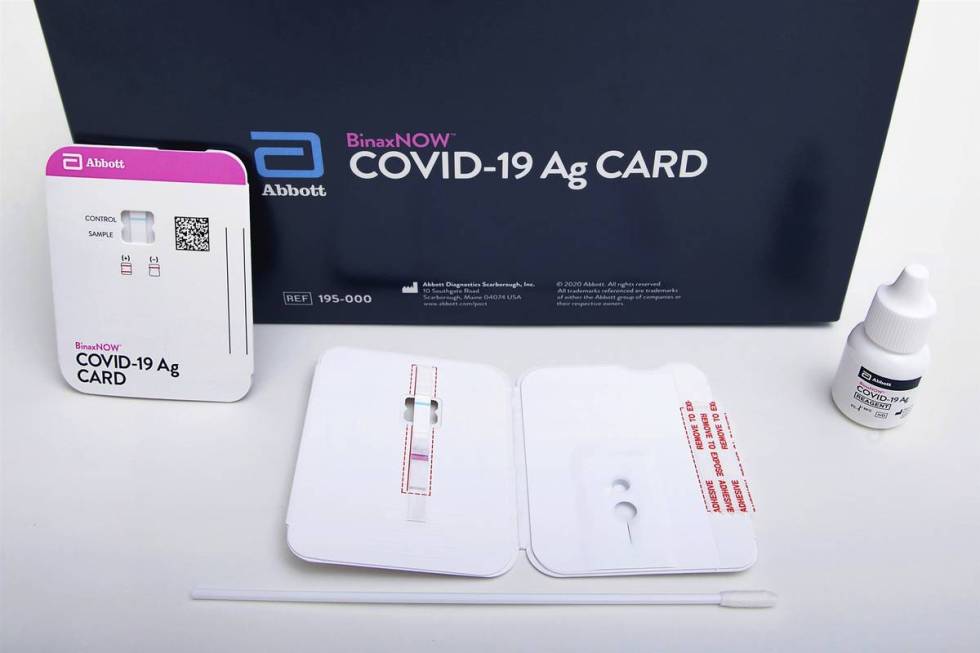Feds halt shipments of rapid COVID-19 tests to Nevada

The federal government is halting shipments of rapid COVID-19 tests to Nevada and seven other states until they use supplies already received.
On a call with reporters Monday, federal testing czar Brett Giroir called out the states for not distributing the Abbott BinaxNOW tests sent to them, including Nevada, Hawaii, Massachusetts, New Mexico, North Dakota, Vermont, Virginia and West Virginia, according to the medical technology website MedTech Dive.
“We just don’t want the tests to be sitting in a warehouse,” said Giroir, assistant secretary for health.
A Nevada spokeswoman said a representative of the U.S. Department of Health and Human Services had contacted the governor’s office and “explained that Nevada was taken out of the distribution queue because it had not distributed all of the tests received to date.”
“It was indicated that Nevada would be put back into the queue once the tests on hand were distributed,” said spokeswoman Shannon Litz.
License issues
In response to a question from the Review-Journal, Gov. Steve Sisolak said at a news conference Tuesday night that the delays in distribution resulted from license requirements for people distributing the tests.
Nevada planned to supply the BinaxNOW tests to the Department of Corrections at the request of the agency that operates the state’s prisons, Julia Peek, deputy administrator with the Nevada Department of Health and Human Services, said during a press briefing Monday. She also said another possible use for the tests would be in Nevada schools, which in Clark County are conducting classes online because of the pandemic.
The state has received about 200,000 of the tests and expected by December to have received 920,000, state official Malinda Southard told the Nevada COVID-19 Mitigation and Management Task Force last week.
The Trump administration announced in late August that it had awarded a contract for $760 million to Abbott for delivery of 150 million rapid tests.
“Testing will be potentially deployed to schools and to assist with serving other special needs populations,” the administration said its announcement.
Accuracy trade-off
The BinaxNOW test, which received emergency use authorization from the Food and Drug Administration, does not require laboratory equipment and can deliver results in 15 minutes or less. It and other so-called antigen tests detect certain proteins in the coronavirus.
The tests are faster and less expensive than polymerase chain reaction tests, which detect the genetic material of the virus. As a result, rapid tests may be more efficient in testing large numbers of people.
However, the rapid test is not as accurate, with an increased chance of giving a false positive result.
“No test is perfect, but there are consequences to varying degrees of less perfect,” said Mark Pandori, the state’s chief of testing and director of the Nevada State Public Health Laboratory in Reno.
“If false positive individuals are put into quarantine along with other truly positive people, that is very bad,” he said.
Better than no testing?
However, some argue that imperfect testing is better than no testing, and false-negative tests “may not be strongly positive and are not an infectious, public health threat,” Pandori said.
He acknowledged he is critical of the tests, but added, “I respect these counterarguments.”
State officials may have no other choice. In early October, federal health authorities told Nevada to reverse course on its decision to ban two types of rapid COVID-19 tests used in nursing homes.
Nevada banned Quidel Sofia and BD Veritor tests on Oct. 2, saying they were “accurate for detecting individuals with COVID-19, but less accurate for correctly detecting when someone does not have COVID-19.”
Anecdotal reports from 12 nursing facilities in the state showed problems with the tests, including one report that found 60 percent of positive antigen tests were false. State health officials attributed the problems to inadequate training by people administering the tests, failure to follow the manufacturers’ instructions, or failure to confirm the result with another test within 48 hours.
Giroir said in October that Nevada was prohibited by federal law from imposing the ban. False positives are inevitable in virus screening, he said, and identifying 40 percent of real positives would save lives in nursing homes.
Contact Mary Hynes at mhynes@reviewjournal.com or 702-383-0336. Follow @MaryHynes1 on Twitter. Review-Journal staff writer Bill Dentzer contributed to this report.